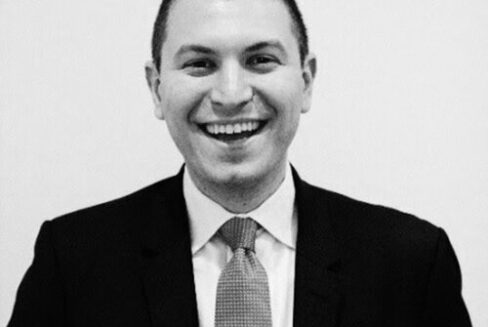
Project Healthy Minds is on a Mission to Bridge the Mental Health Treatment Gap
We are in the midst of a global mental health crisis, and its treatment gap is astonishing. More than 615 million people struggle with a mental health issue globally, 65 million of whom live in the U.S., Project Healthy Minds founder Phil Schermer said during a recent interview with The Related Life.
“Despite that prevalence, 60% don’t get any form of help,” Phil noted. “What’s driving the treatment gap?”
Answering that question – and improving access to care – are driving forces for the nonprofit. Related recently partnered with Project Healthy Minds to aid in its mission to destigmatize mental health and help people find care. The partnership came on the heels of a whimsical and long-running exhibit at High Line Nine titled "The Pippins: A Dilemma of Colors" that featured works by the late Charles W. Norton. Today, the first phase of that partnership can be seen at Hudson Yards, where physical and digital images of the Pippins are installed throughout the campus – with each one linking to Project Healthy Minds’ website.
The Project Healthy Minds Mission
Phil brought more than a decade of unique experience in finance, technology, entertainment, nonprofit and policy work to form Project Healthy Minds. Its mission is to be the “Expedia.com for mental health services” – the front door on the internet for accessing mental health resources, vetted by clinicians, but free for the public use. The nonprofit aggregates the full spectrum of mental health services – including meditation, mindfulness, therapy, psychiatry, peer-to-peer support, community support groups and crisis lines – then helps visitors find the right help based on their emotional health needs.
Although the mental health tech nonprofit is still a startup, it’s been years in the making, with an origin story tied to one of the most impactful songs of the aughts: Logic’s 2-time Grammy-nominated song “1-800-273-8255”.
“Four years ago, I was at breakfast with two friends of mine who manage well-known musicians including the hip hop artist Logic,” Phil said. “And they told me a story over breakfast that inspired the creation of Project Healthy Minds.”
The 8-times platinum song’s full title is actually the phone number of US National Suicide Prevention Lifeline. Logic wrote the song to document his own mental health struggles, and the song has proven so resonant that its release and multiple live performances have been tied directly to increased call volume for the National Suicide Prevention Lifeline.
Inspired by this organic effect, Phil dove into a research journey around why the song has proven so effective in helping people seek care.
Bridging the Gap
There are three main drivers of the treatment gap, Phil found. First is the stigma that precludes people from ever asking for help. Second is that people don’t know where to get help. (“If you have ever tried to find a therapist in New York, you know how miserable that process is and how long it takes,” he quipped.) And the third is the cost of care, reflecting a combination of the lack of mental health professionals and insurance not paying adequately for mental health care, he explained.
“I realized that the song was this unbelievable public health case study for how you close the treatment gap,” he said. “The lesson of Logic’s song is that when a public figure ‘comes out’ about their mental health journey, it creates a permission structure for other people to do the same – destigmatizing the topic. And if you provide people, in that moment, with somewhere they can find help – in Logic’s case that was making the title of the song the phone number of the Lifeline – you can inspire a lot of people to take action to access care. That’s the key: marrying the coming out moment with some easy way for people to find help – no matter what type of mental health care they need or want.”
He continued, “That’s what we’re building at Project Healthy Minds. On the consumer side, we’re building the world’s first digital mental health marketplace to democratize access to life-changing services and we’re partnering with culture-makers – musicians, athletes, actors, comedians, digital influencers, artists, leaders in fashion – to destigmatize mental health. If you did those two things together, you could build something novel that served tens of millions of people.”
Normalizing Workplace Wellness
In addition to its consumer-facing work around stigma and streamlining access to mental health services, Project Healthy Minds is right now working to create the first national standards for businesses on employee mental health. It counts Related as a partner in doing so.
“Covid accelerated the recognition among CEOs, management teams and boards that mental health and burnout was a huge issue for the workforce,” Phil said. “It is one of the contributors to the so-called 'Great Resignation.' Every business is now trying to figure out what they should be doing. How does a company ensure that its workforce does not burn out and is mentally healthy?”
Seeing no playbook, guide or research that truly addresses this need, Project Healthy Minds is focused on creating the first national standards for ESG – corporate-speak for Environmental, Social and Governance initiatives. Its consortium of partners across industry, public health, and government is working to develop frameworks to measure and ensure consistent, evidence-based data collection across businesses.
“We want public companies to disclose to markets some level of information about their workforce’s mental health. In the same way that there is a huge push for companies to disclose climate impact with a formalized methodology, we want the same thing for mental health,” Phil said.
If you’re interested in getting further involved with Project Healthy Minds, please contact Phil at phil@projecthealthyminds.com.
The Related Life is written and produced by the Related Life Editorial Team. Be sure to follow us on Facebook and Instagram for the latest events, news and announcements in your area, and tag us for a chance to be featured @therelatedlife and #therelatedlife.
